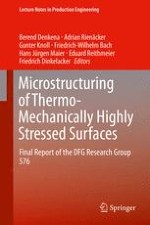2015 | Buch
Microstructuring of Thermo-Mechanically Highly Stressed Surfaces
Final Report of the DFG Research Group 576
herausgegeben von: Berend Denkena, Adrian Rienäcker, Gunter Knoll, Friedrich-Wilhelm Bach, Hans Jürgen Maier, Eduard Reithmeier, Friedrich Dinkelacker
Verlag: Springer International Publishing
Buchreihe : Lecture Notes in Production Engineering
